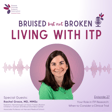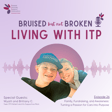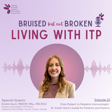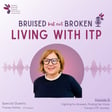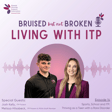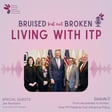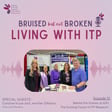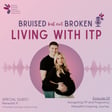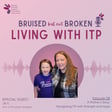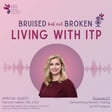Become a Creator today!Start creating today - Share your story with the world!
Start for free
00:00:00
00:00:01

Parenting with Platelet Counts in Mind: Managing ITP in Young Children
If you're parenting a toddler or preschooler with immune thrombocytopenia (ITP), this episode is for you. Pediatric hematologist Dr. Michael Tarantino joins us to share practical advice on keeping young children with low platelets safe without taking away their childhood. From babyproofing tips and daycare questions to navigating sports, tantrums, and emotional support, Dr. Tarantino offers expert insight grounded in compassion and experience. Whether you're new to ITP or deep in the trenches, you'll walk away with strategies, reassurance, and resources to help your family thrive.
Transcript
Introduction to ITP Concerns and Podcast
00:00:00
Speaker
So the falls are what ah really concern me the most, and depending on the severity of the ITP, what the platelet count happens to be, then that really sort of guides our ah recommendations for for what to do.
00:00:25
Speaker
Welcome to the PDSA podcast, Bruised But Not Broken, Living with ITP. The diagnosis of a bleeding disorder like immune thrombocytopenia may leave you wondering, how can I really live my life with ITP?
00:00:38
Speaker
PDSA's podcast, Bruised But Not Broken, Living With ITP, brings empowering stories, the latest research and treatment updates, lifestyle tips, and answers to the real-life questions the ITP community is asking.
Host Introduction and Parental Empathy
00:00:53
Speaker
Here's your host for this episode, Barbara Pruitt.
00:01:04
Speaker
If you are a parent with a toddler or a preschooler that has been diagnosed with ITP, I feel for you. I'm a parent.
00:01:15
Speaker
I've got grandchildren that are toddlers. I can only imagine the stress that you're going through with a diagnosis like this. Well, today you're in luck because we are joined by Dr.
Interview with Dr. Michael Tarantino on Child Safety
00:01:28
Speaker
Michael Tarantino.
00:01:30
Speaker
He is a pediatrician and a hematologist. and has a litany of ah things that you want to hear about. He's he's the chief executive officer, the chief medical officer, and president of the Bleeding and Clotting Disorders Institute, as well as a professor of pediatrics and medicine at the University of Illinois College of Medicine in Peoria.
00:01:55
Speaker
He is also one of our PDSA medical advisors, who we greatly appreciate. And here he's back again to talk to us about young children and toddlers who have low platelets and how to keep them safe.
00:02:10
Speaker
So welcome, Dr. Tarantino. We greatly appreciate your presence on today's podcast. Hi, Barbara. It's great to be back. and again, talking about our favorite topic of conversation, ITP. yeah Absolutely. And it's so nice to talk to somebody that has the answers to questions that we have.
00:02:30
Speaker
And I know with toddlers, it's, it's, got to be so stressful on the parents. Toddlers are unsteady to begin with. And the thought of them falling if they've got low platelets just is horrifying, I'm sure.
00:02:44
Speaker
what What are your biggest safety concerns um when it comes to toddlers with low platelets? And have how can the parents handle this at home? How can you help them handle this?
00:02:58
Speaker
Yeah, Barbara, that's ah such an important ah ah area to cover and to make sure that we do what's best for the safety of the toddler.
00:03:09
Speaker
I think that it's fair to say that our living spaces are designed mostly for adults and ah toddlers are designed to challenge every aspect of living in a place that's designed for adults.
00:03:27
Speaker
right? they They look for ways to get hurt um or to fall. um So and and honestly, it it happens with very little notice.
00:03:38
Speaker
So I remember the days ah when we raised our three kids when they were toddlers. But I always ask the parents of toddlers, really, how how many minutes of the day are you not watching your child when they're awake?
00:03:51
Speaker
And it's it's essentially zero. Either they or another caregiver like ah an extended family or a daycare personnel um have to really watch the kids always when they're at that age because they they they're explorers and they just love to satisfy their
Strategies for Toddler Safety at Home
00:04:10
Speaker
curiosity. And sometimes it's instantaneous. And, the you know, that's a recipe for getting hurt, especially in the in the way we sort of configure our living quarters.
00:04:21
Speaker
um So there's already ah foundation of watchfulness among parents. And they already know that when kids ah begin to, in their toddler years, begin to walk, for example, they already know they're going to fall frequently, especially when they try to move quickly, like when they first start to run quickly.
00:04:45
Speaker
they're gonna fall no matter what. ah and When they try to navigate steps on their own, ah even with the parent right behind them, they're gonna fall at times. so So the falls are what ah really concern me the most.
00:05:00
Speaker
And ah depending on the severity of the ITP, what the platelet count happens to be, um then that really sort of guides our ah recommendations for for what to do.
00:05:14
Speaker
In the in the the sort of of the least ah intrusive way, of say the platelet count is above 50,000 always and the toddler is not that adventurous, you know it's basically just reducing the fall risk.
00:05:32
Speaker
And whether that's close watchful sort of supervision um or whether it's modifying the the house, like the furniture in the house, then we make sure we cover all those bases.
00:05:46
Speaker
Because when when anyone really goes about their house and looks at sort of risky spots of the house ah for for falling, they're going to be there unless you you've already addressed them.
00:05:59
Speaker
Like, for example, you might have a hardwood floor that's very slippery if the toddler is just wearing socks, for example. And then that that may transition to a carpeted surface where it's not so slippery.
00:06:12
Speaker
And if a toddler runs from the carpeted surface onto the hardwood floor or the ceramic floor, whatever the hard surface is, that can create a big fall risk. So we we really try to like cover even those details when it comes to preventing kids from falling.
00:06:28
Speaker
Yeah. Well, i've I've also heard that you know parents should maybe get on the floor and look at their house at a toddler's level because what you see when you're standing as an adult is not the same as when you're down there in that level and you might see more areas of danger that need to be addressed.
00:06:48
Speaker
Yeah. I know yeah the pool noodles the pool noodles are great for covering up you know sharp corners and stuff. Do you ever recommend you know a child maybe be to wear a helmet or padding or anything like that?
00:07:04
Speaker
Yeah, we we absolutely have, um especially especially in the house. Now, I'll talk about like daycares in ah in a moment, but ah you know if the child is prone to falling ah and and has a particularly low platelet count, like especially if it always runs below 20,000,
00:07:25
Speaker
their their risk of serious bleeding goes up the more the platelet count goes down. Now, to to be clear ah and and to balance what what is in all of the medical journals, that even kids with very low platelet counts have a ah relatively low risk of having serious bleeding, especially inside their head.
00:07:46
Speaker
But that risk steeply rises when the child hurts their head. ah And sometimes, you know, that momentum of a child running um and then tripping and falling with that kind of momentum, ah hitting their head on a hard surface um can sort of override that low risk ah that that happens usually with ah with ITP in children.
00:08:10
Speaker
So ah head trauma, we take very seriously and we try to prevent it. You raise a really good point, Barbara, that sometimes the surface of a coffee table, for example, may look okay, but the legs below it may have um you know carvings or or detail on it that could end up with a sharp surface or a ah very um hard blunt surface that we we do talk to our parents about.
00:08:36
Speaker
making sure that the legs of furniture, the edges of furniture below like the seating level are are are safe as well with some kind of cushion protection.
00:08:47
Speaker
I mean, sometimes pieces of furniture ah just are not ah compatible with having a toddler. So sometimes we do recommend, you know, put that in storage for a while until your child grows up a bit and and then ah and then bring it back out.
00:09:03
Speaker
Well, bottom line, we want to keep them as safe as we can. The other side of the coin is we want to let them be a child or be a toddler. So with that in mind, are there specific activities or toys or ah direction you might help to lead a parent in for their toddler?
00:09:23
Speaker
Right, so the the the surface of the toy, especially if an older sibling throws it at the the toddler, ah could be very dangerous to them. So we we do counsel on the safety of of toys, you know, the softer the better.
00:09:39
Speaker
ah The issue with helmets, you know, ah we We should always keep an open mind about that because sometimes you'll hear colleagues or coworkers say, oh, that child's never going to wear that helmet.
00:09:52
Speaker
ah They'll take it off as soon as they put it on. But then ah the next at the next visit, the the parent will say, you know, he he kind of likes to wear the helmet, so we let him wear it. so So I think keep an open mind about ah the issue of protective gear like a helmet, elbow pads, knee pads.
00:10:08
Speaker
ah Keep an open mind about that because sometimes the child doesn't mind it. And if they're especially active, especially if they're just learning to walk and run, it could save you a ah lot of a lot of problems. Yeah. i i had a brother My youngest brother knocked himself out a few times as a toddler when he was learning how to walk. And our pediatrician at the time had him wear a helmet.
00:10:34
Speaker
you know, an army helmet. And we've got pictures of him with his army helmet and his diapers on, you know, um and he didn't have ITP. So it's just a protective
Educational and Emotional Support for Families
00:10:44
Speaker
thing. So, and that's what we want. We want to want to keep these kids safe.
00:10:48
Speaker
Today, in today's society, most households have two working parents. And I know childcare is a very big issue. um What advice do you give parents?
00:11:01
Speaker
when it comes to daycare preschool for these children with ITP? um Are there extra precautions that they need to take? you know What kind of advice do you give them when they're looking in that direction?
00:11:15
Speaker
Yeah, that's a vitally important question. a lot of it has to do with A lot of our response to that has to do with really vetting and really doing our homework with that particular daycare ah organization, the ratio of children that the daycare manages with, like the ratio of children to to staff um is very important.
00:11:43
Speaker
if one If one staff member is sort of overseeing you know a dozen or 20 children, then we know that there's going to be some some um some surveillance gaps, right?
00:11:59
Speaker
You know, I think some of that some of that is just sort of comes naturally to the parents. um But we go over it anyways, because sometimes we teach each other about the nuances.
00:12:09
Speaker
um the The reputation of the daycare center, so you know talking to friends or or um others that may have experience with that particular daycare is important.
00:12:21
Speaker
We have an education team that is always available to go to organizations like daycares and educate them about ITP and what they need to watch for, especially if the the child is a toddler and new to that particular daycare center.
00:12:38
Speaker
Yeah. No, that's wonderful that you have that available in Peoria or in your area. I know a lot of areas don't. One thing that I know that the PDSA has to offer is a ah resource booklet for schools and for preschools. and it And what it does is it explains what ITP is, and and and it explains what they need to look for, and it it makes it a lot clearer for them. And I know that a lot of parents have really been you know so happy getting this you know resource booklet from the PDSA, and it's free. If you're a member, you can call and have one sent to you.
00:13:20
Speaker
And um it's also a very good thing to show family members and grandparents and friends, because Like we all know, sometimes you may have a low platelet count, but your child may not have bruises at that time, or the bruises may not be seen.
00:13:40
Speaker
And the child looks purple perfectly normal. you know Do you give any advice to the parents on how they should address that with other people, and telling them, you know oh, be careful, I don't want little Johnny to get hit by your child, whatever?
00:13:56
Speaker
Yeah, so that's also very important um because many of our families have ah both parents working out of the house and the child is left with relatives or or at a daycare center.
00:14:11
Speaker
So we encourage them to bring whichever family member is going to be primarily doing the child care while the parents are at work to come to the visit and hear what we have to say about ITP.
00:14:24
Speaker
And we give them sort of like the counseling. Sometimes they bring up very important questions like, uh, I have a pool in my backyard. What should I do? Um, or, um, I have a, I have a pet and what do I do if the pet, you know, accidentally, um, pause the child or jumps on the child or whatever.
00:14:42
Speaker
um being playful. So we we ah we have ah good advice for for them as well. And we consider them part of the care team. So we're we're happy to see them in the visit as well.
00:14:56
Speaker
As far as the daycare is concerned, one thing I didn't mention is that um just naturally when the kids are in a group, kids sometimes scuffle with each other.
00:15:06
Speaker
Sometimes it's just being playful. Sometimes, ah you know, one will pull a clump of hair out of the other. ah when they're really just trying to be playful, right? So we ah pay special attention to that and and really to um caution the daycare workers about um any kind of physical interaction between um our ah our patient with ITP as a toddler and other kids that might be at the daycare.
00:15:33
Speaker
Well, and i I know toddlers, when they're teething, they tend to bite the person next to them. You know, they so they could get a big bruise, and it happens so quickly. You don't know that that's going to happen. But at least if the caregiver knows, you know, put some ice on it, you know, might want to call the parent right away and let them know. But um you brought about a really great point. I never thought of this, that you should bring the caregiver to an appointment with your child.
00:16:02
Speaker
And so that person can ask questions and you can, you know, fill them in on some of the parts that they need to be worried about. That's such great advice. That's terrific.
00:16:15
Speaker
Yeah. Face-to-face that's best. Um, we, we've often called, uh, grandparents or aunts or uncles who might take care of the child, uh, and had a conversation over the phone like that.
00:16:27
Speaker
Um, but it's very, it's very sort of, uh, um, impactful, even more so when it's a face-to-face encounter. So we we openly invite them to come. that's That's great.
00:16:39
Speaker
Now, toddlers are known for having temper tad tantrums, and they also will have accidents. you know Things happen that we have no control over.
00:16:51
Speaker
But when a child has really low platelets and they could bruise or bleed, you have any strategies for I don't know, temper tantrums are kind of out of my league. I don't know how you handle that. But um for parents trying to deal with maybe a kid that's very emotional in that way.
00:17:10
Speaker
Yeah. So ta like other things, temper tantrums are very unique to the child. Sometimes it's just a little bit of breath holding or screaming out. And sometimes it's banging their head against the wall ah in order to sort of you know, sort of vent some of their stress or whatever is causing them to have the tantrum.
00:17:29
Speaker
So the the biggest advice we give to the parents is just protect them during that time. um They can't allow them to to hit their heads on the wall or to injure themselves in in any way similar to that.
00:17:43
Speaker
um I think the breath holding, you know, I think the the general pediatricians have advice about breath holding. I mean, typically they're short lived and they don't really harm the child at all. But I think that there are some children that will do it to the extent of passing out and then falling and then potentially hitting their heads. So again, we tell the parents, you really have to protect the child, meaning be around them and get between them and the hard surface they might be using to injure themselves or be sure that their child is not safe.
00:18:19
Speaker
ah they're ah if if they do sort of temporarily pass out that they're there to to catch their fall and not allow them to hit on a hard surface with their head um yeah or their face. you know Wow.
00:18:34
Speaker
Well, when you think about safety at home, is there anything that stands out in your mind that might be hazardous that we don't necessarily think of?
00:18:45
Speaker
Or is there environments that maybe you would consider more risky for a child or a toddler with ITP? Well, the nemesis is always, to me, the stairwells and the stairs.
00:19:02
Speaker
So um as much as it seems um innocuous for a child to climb stairs, sometimes they lose their footing and ah and ah their body slips out from under them and their head then bangs on the step.
00:19:15
Speaker
more More commonly, they fall down the steps when they try to come down the stairs. So obviously, I think this is this is really a natural ah caution for for parents to not let kids, just especially toddlers, go up and down the stairs unsupervised.
00:19:32
Speaker
And they should be close by ah and really ready to catch them if they slip or fall. And gates at the top and the bottom are always... helpful as long as they're used consistently.
00:19:45
Speaker
Yeah, absolutely. Especially if they're not, the child's not ready to, to navigate the stairs when they're first learning to walk, that's not the time to conquer the stairwell. Yeah.
00:19:56
Speaker
I know that this is first and foremost in a parent's mind, but what kind of emotional support or resources do you recommend for parents who are constantly worried about keeping their child safe, because this could be extremely tiring on the parent or parents, of course.
00:20:19
Speaker
Oh, absolutely. And I think ah some of the resources that you mentioned through PDSA um are are very useful. ah We ah sort of keep ah a network of our own patients that care for or have cared for young kids and and toddlers.
00:20:37
Speaker
And ah we do connect some of them so they can talk to a person who's going through it also or has recently gone through it. Because ah really that sort of peer relationship yeah with people that are going through the same thing ah is very important.
00:20:54
Speaker
Certainly we're available to them at any time, you know, and if things are getting to be overwhelming, ah we we do have sort of the professional staff, like our social worker, like a liaison with with counselors, et cetera, to help if ah if some of that gets a little bit overwhelming.
00:21:12
Speaker
Well, the PDSA actually has an ITP Kids and and Parents teleconference. so And every few months, the PDSA hosts a Zoom call where both children and parents get to meet other families virtually to ask questions and share experiences.
00:21:32
Speaker
Most of the time, there there will be ah ah doctor on the call. which is great. I know you've participated before, Dr. Tarantino. And um sometimes for these parents, it's actually the first time that they've ever had any kind of an interaction with parents of another child with ITP.
00:21:56
Speaker
And um this connection that they make is really great. I've heard from many parents through the years that this has been a lifeline for them. And, you know, they don't have to wait for ah teleconference to happen. They can share, you know, information on how to contact each other, phone numbers or um emails.
00:22:19
Speaker
And, you know, maybe sometimes you just need to talk to another person that knows what you're going through, or that maybe their child's a bit older and they have gone through what you've gone through and they might have some special advice for you. so To get more information on the teleconference, you can go to the PDSA website. But, you know, if you're a member of the PDSA, you will automatically receive an email that will tell you when the teleconference is happening so you can go ahead and sign up for it.
00:22:52
Speaker
That's a little plug for them, but I can't tell you how valuable that is. um Like I said, so many parents are just so appreciative of that. And also the kids are, because I see some of these kids at the conference in the summer, and they know each other because they've been on the teleconference calls.
00:23:10
Speaker
And sometimes on the teleconference calls, they let the kids talk for 30 minutes without the parents, and then the parents come on and let the kids go do whatever they're doing. And it's it's really great to see them actually meet each other face-to-face at the conference. So um that's great.
00:23:28
Speaker
Now, many kids are diagnosed with ITP and they go into spontaneous remission.
Understanding ITP Remission and Management Strategies
00:23:35
Speaker
Can you explain what that means? and are there any figures on the percentages of children that this happens to? And if they do go into a remission, do they need to be, do the parents need to be worrying about the future?
00:23:49
Speaker
Barbara, that's a great question. And it's one of the things that sort of distinguishes ITP in younger children from ITP in older teens and adolescents and and adults.
00:24:00
Speaker
And that is that most and most children, especially below the age of 12, will have their ITP spontaneously resolved. like as in go away, because it's really in most of them, it's really not all, but most of them, it's really not a true autoimmune disorder.
00:24:20
Speaker
Most of the time, it's their immune system's reaction to some kind of infection, typically virus infections, and their body sort of gets confused. The immunity gets confused between getting rid of the virus and attacking platelets.
00:24:36
Speaker
Thankfully, in most kids, that's short lived. So um many studies have looked at what happens in the first six months and 12 months after the diagnosis of ITP in a child.
00:24:48
Speaker
And ah they they pretty much agree that about 80% of kids will have their ITP resolved by six months after the diagnosis.
00:24:59
Speaker
And some, you know, quicker than that. And then by a year, and a very nice study that was ah ah the result of an intercontinental registry showed that by a year, it's closer to 90% that have resolved.
00:25:15
Speaker
So there are obviously there are exceptions to that, but but for the most part, ITP in younger children is a short-term illness. Now, there's no way to predict that in the beginnings.
00:25:28
Speaker
We've looked at ah this issue in our ITP program here. Many others have looked at it. There's no fail-safe way to predict which child's going to have the long-term version of ITP or which is going to ah spontaneously resolve within a year.
00:25:43
Speaker
Now, when it does go into remission or resolve, I mean, is that over with or is there a danger in the future that it may relapse? Or do we know that?
00:25:57
Speaker
Well, I think we have some information that ah that partially answers that question. Like years ago, we looked at a group of our ITP patients when I was on the faculty at University of Louisville, about 300 kids that had ITP that resolved and the likelihood that their ITP ah would would return at some point.
00:26:19
Speaker
and And then it was about one to 2%. So the overwhelming majority don't have their ITP come back. Now, i'll I'll admit that we didn't follow those kids throughout their whole life, right? well So a longer term follow up study would answer that question better.
00:26:39
Speaker
But we followed some of those kids for for 20 years. And um the the percentage that recurred, if it was the typical short course of ITP after diagnosis, only about one to 2% had it ever come back.
00:26:53
Speaker
Okay. Well, that's interesting information because I've never heard that. that's That sounds very hopeful for the parent that their child goes into remission. As a parent, I know when you see your child suffering like this, we want a quick fix. We want something to fix them right away. And and as you know, there's no quick fix. And one strategy for handling ITP in children is watch and wait.
00:27:23
Speaker
And that I'm sure goes against the grain of an anxious parent, but can you explain what watch and wait is and why it is such a prudent way to move forward with their child?
00:27:38
Speaker
Not all, I understand, but Right. So, Barbara, I'm sort of this smiling and chuckling internally because the virtues or perils of the watch and wait philosophy have been debated debated ah since before I was ever a physician, and I became a physician in 1987. So, almost so ah for almost Well, for all of the 37 years of my career and probably decades before that, there has been this debate about whether to watch and wait and not give drug treatment for the ITP when it's diagnosed in a child or to give drug treatment.
00:28:21
Speaker
The premise is that the risk for serious bleeding, especially bleeding inside the brain, the brain um is quite low. And in many studies, in fact, at two or three studies that I did, the risk is about 1% or half of 1%. So,
00:28:39
Speaker
so From one vantage point, less than 1%, a half of a percent seems like a number worth taking a risk for and and just watching the ITP and not treating it.
00:28:52
Speaker
From another vantage point, 1% risk means that 99 children out of a group of 100 won't have the problem, but one will. And I don't want that child to be my child.
00:29:04
Speaker
um So that risk ah to some people is high enough of a risk that really warrants treatment to be given. Now, that's assuming that the treatment will prevent that bad event from happening.
00:29:19
Speaker
And there's even debate about that. So, ah The watch and wait sort of approach ah is used by many of my colleagues. I don't use it if a child's platelet count is one, below 20,000 at the time of diagnosis, and two, if they're a particularly active child that you know is likely to injure themselves.
00:29:44
Speaker
And three, if the family doesn't have immediate or ready access to emergency care in the event there is some trauma or some bleeding that occurs.
00:29:55
Speaker
So many of my my patients live in rural areas. They may be, you know, the better part of an hour from the closest medical facility. And I think that's too high of a risk to take to use the watch and wait approach.
00:30:09
Speaker
The additional premise of watch and wait is that the drug treatment doesn't affect the ultimate outcome with the ITP, whether it spontaneously resolves like we talked about or whether it goes on and becomes a chronic ITP.
00:30:26
Speaker
The drug treatment that we give in the beginning does not change that. So the idea is, well, if it's not going to change it and the risk of serious bleeding is low, then why give it at all? But we know that children are children and some of the children I see in my clinic hurt themselves in the in the clinic room, like get underneath the exam table and stand up quickly and hurt their head.
00:30:47
Speaker
I mean, obviously we tried to prevent that um as best we can, but it's will be kids and and they're prone to injury. So ah while the watch and wait may be used by many ah pediatric hematologists, I do it only in selected cases.
00:31:06
Speaker
Okay. Which makes a lot of sense because for all the reasons you stated, if you're far from an emergency room, you know, depending on the child, I mean, that makes a lot of sense.
00:31:17
Speaker
We have a couple of questions from social media and Crazel She asked, can children do sports even if their platelet count is normal?
00:31:30
Speaker
I'm assuming she's talking about a child with ITP who has now a normal platelet count. I don't know under what circumstances, but what kind of advice would you give her?
00:31:45
Speaker
Yeah. So this, maybe my answer will sort of transcend the toddler years, but I do want to say something ah particular to toddlers in that many like activities or sporting activities ah involve ah ah these bouncy house sort of contraptions, right?
00:32:02
Speaker
These inflatable toys that go in and jump around in. And i I've not uncommonly seen kids get hurt in those um in those because they fall on each other. They jump and and let loose and have fun.
00:32:16
Speaker
And sometimes they fall each other and hurt each other. Yeah, they collide in those bouncy houses. Yeah. Sometimes, you know, there's a good amount of momentum in what they're doing. And if, right, two heads come together, then both kids can get hurt, and especially the child with ITP. So i do I do sort of recommend extreme caution, maybe limit it to one other child in there or no other children in there, and let the child ah with ITP, like,
00:32:42
Speaker
bounce around on on their own freely. um Because I think in and otherwise, those inflatable units tend to be pretty safe. So I will tell you this though, that if a child does participate in a ah sport that has regular practices and events, game events, that we do check their platelet count a lot more frequently during that time.
00:33:05
Speaker
Because we we really can't predict what the platelet count will be on any given day. And we want to avoid, obviously we want to avoid injury during a sport with a really low platelet count that we don't realize.
00:33:17
Speaker
So we check it pretty frequently during that time. Now, if if the child tends to have a normal platelet count and a sustained normal platelet count and wants to participate in one of these more active sports, would you probably get a platelet count before they would start it and maybe periodically, maybe not as frequently, but depending on what the count is, you'd still want to check it during that sports season or during their participation?
00:33:48
Speaker
Yeah, Barbara, all of that, all of that. yeah so a lot more surveillance, but ah we do recommend the riskier sports, especially in the first six weeks to a few months ah after the diagnosis.
Guidance on Sports Participation for Children with ITP
00:34:03
Speaker
Because especially if we've given treatment like immune globulin or steroid treatment that we're trying to wean ah wean the child off from, the platelet count can change pretty quickly.
00:34:14
Speaker
So we we don't want to be on the wrong side of you know an injury with a platelet count of 5,000 that we didn't happen to check. you know So really to to close that loop, ah we'll we'll tell them really for the next six weeks, I would say you need to take a pass on sports.
00:34:30
Speaker
um Yeah. oh mike um All of my colleagues around the country may not agree with that, but we think that's the most prudent because, again, the platelet count during that time is pretty unpredictable in some of the kids.
00:34:44
Speaker
But if their platelet count is is normal consistently, we're checking it frequently, then really they can participate in most ah sports. We have our own opinions about American football and in children, and I always...
00:34:58
Speaker
ah I always quote a study that was done long ago that ah the average child coming out of JFL, the junior football league, which means they're going on to high school and they're 14 years old, has had ah at least two concussions.
00:35:15
Speaker
Wow. That's not good. and i mean, some have zero, obviously. Some have more than two. So yeah we sort of try to steer kids away from American football when they're that young.
00:35:27
Speaker
Yeah, some parents don't agree with that either, but we we have to tell them what we think is best. Well, I have another question from Mary W., who says, what platelet number is truly safe for activities?
00:35:42
Speaker
She has a nine-year-old daughter who has a platelet count of 6,000, who is struggling with not being able to participate in bike riding, playing ball, or running on the playground.
00:35:55
Speaker
That's a difficult situation, I know. Well, Barbara, I know you can relate to this with all the experience you've had ah with PDSA that There are occasionally ah ah children out there who have platelet count of 6,000 despite attempts at treatment.
00:36:16
Speaker
right right it is the It is the exception to the rule. I mean, most kids respond to some therapy, some treatment. and If the question is that the nine-year-old daughter has a platelet count of 6,000 and the physician is taking the watch and wait approach, then i would recommend a ah real heart-to-heart conversation with that provider and let them know that ah there's an emotional struggle going on with that kind of restriction when it could be ah much different if there was good treatment ah used in that and the in this particular trial. ah
00:36:52
Speaker
child So right if if their platelet count is only 6,000 despite every attempt at treatment, then possibly a referral to an ITP ah center, you know, where the clinicians are very focused on ITP, and there are several in the country.
00:37:10
Speaker
ah might be a good idea. maybe there Maybe her child goes to one of those already and maybe you know nothing has worked with multiple attempts at different treatments.
00:37:20
Speaker
But but if if it's not that case, I think there should be first a discussion with the the healthcare care provider about um using medical or and drug treatment to to raise the platelet count so the child can participate in some of the sports.
00:37:37
Speaker
Right. and i And I also would think that any child that is struggling, like a an elementary school child or are older, you know, mental health is really important. And to see a clinician of some sort to help them get along in this journey might be really helpful, even at an early age.
00:37:57
Speaker
That's ultimately important because... very easy for healthcare providers to say, well, just don't do that. the play that comes, no, just don't ride a bicycle. But it's ah it's much more difficult for a child to um be left out of what their peers are doing and what they may look really enjoy doing.
00:38:18
Speaker
So we we need to make every attempt, not only for their physical health, to make sure their platelet count is at a safe range, but also for their mental health. So you you raised a good point that their primary health care providers should be also talking about and and facilitating ah some help with a mental health professional if needed.
00:38:40
Speaker
Absolutely. Well, we have one more question from Facebook. Abby asks, what range of platelets is safe for a young child to go to daycare?
00:38:52
Speaker
Well, I wish I had the 100% correct and validated answer to that, but I don't think there's a there's an exact ah answer, really. I know that many ah physicians have sort of and hematologists have developed their own sort of metric ah about this.
00:39:10
Speaker
In our clinic, we've said if it's above 20,000 for a child with ITP, if it's above 20,000, I think they're safe to go. But everything we talked about before, about educating the daycare, about having a plan f ah if an unforeseen ah slip or fall or whatever accident occurs um is in place,
00:39:32
Speaker
we trust the daycare, we've had an in-service with them, the parents have vetted the daycare as much as they possibly can, then I think above 20,000 is okay. Good. I know there's no silver bullet for treatment. There's no silver bullet answer either for what's safe, and each each case is very individual.
00:39:52
Speaker
You've gone over some fabulous points here. some You've given us a lot of insight into the treatment and how you handle your toddler or your preschooler at home. um I know that this has been extremely helpful for any parent that's listening or family member that's listening.
00:40:11
Speaker
And ah again, the video conference call that that you can sign up for is very valuable for the parents to be able to connect with other parents or caregivers connect and then have your children connect too.
00:40:27
Speaker
If they're old enough to understand that these children on this conference, they have the same thing you do because it makes your child realize that they're not alone in this. Because I know when I was a child and had ITP, I felt very alone, like nobody else had it.
00:40:45
Speaker
I never met anybody with it until I was 45. So I was really isolated in that aspect. But this makes the child feel like, okay, there's other kids out there. I'm not so weird.
00:40:57
Speaker
And I think that would be very helpful. But Dr. Tarantino, you've been wonderful. Thank you so much for being so generous with your time and all of your knowledge and tips have been really great today. And we really appreciate you spending this time with us.
00:41:15
Speaker
And um hey, we'll see with the PDSA conference in July, I'm sure. Right. Oh, absolutely. I wouldn't miss it. And Barbara, thank you for the kind invitation. I'm always honored to share information and learn from you because i know that you're a wealth of information on this topic as well. So thanks for thanks for inviting me.
00:41:37
Speaker
Really, really enjoyed it.
00:41:47
Speaker
How do you live your life with a bleeding disorder like ITP? From working in the kitchen with knives, to navigating sharp corners in your house, going out to eat in a restaurant, traveling on a plane, attending a sporting event, even dancing at a wedding.
00:42:03
Speaker
ITP patient Barbara Pruitt shares her tips and tricks for moving through life with ITP for more than 60 years. Here's her lifestyle lesson for the day.
00:42:17
Speaker
I'm sure as a parent or caregiver of a toddler a preschooler with ITP, your mind is overwhelmed with keeping your child safe.
00:42:28
Speaker
And that's of utmost importance when you have a young child with ITP. My advice for you for the future is to look at the future and maybe start directing your child into some non-contact activities.
00:42:49
Speaker
What do I mean by that? Well, children nowadays are have very active schedules and you want to and avoid the problem of your child engaging in an activity that could potentially be harmful to them.
00:43:08
Speaker
So start thinking about the future now. Think about those alternative activities that might be available to your child. Not only sports, but other things like STEM type classes, groups of different things, creative arts.
00:43:27
Speaker
There are lots of opportunities out there. You just have to look for them. Now, as far as sports are concerned, there are some sports that are appropriate for children with ITP, like golf, tennis, swimming,
00:43:42
Speaker
and other non-contact sports. I would talk to your pediatrician or your hematologist about which of them would be most appropriate for your child.
00:43:54
Speaker
What about chess? I know my five-year-old grandson loves to beat me at chess. There's also coding classes. I mean, kids are doing coding now in kindergarten.
00:44:08
Speaker
And there's also robotics, which sounds so kind of space age type stuff, but this is something that children are really interested in. There's art classes, there's choir, either at school or at your place of worship, dance lessons, scouting, theater classes.
00:44:29
Speaker
There's also a lot of things that summer camps offer. So it might be good to look through summer camp brochures and get an idea of maybe something that your child might be interested in.
00:44:40
Speaker
I know my own experience. I grew up with three brothers and they were very active boys. They were involved in every sport imaginable. But I was the only girl.
00:44:52
Speaker
My grandmother lived with us and she took me under her wing and she showed me how to cross stitch and how to do very simple sewing. So when I was like five and six, I was busy making clothing for my Barbie dolls.
00:45:09
Speaker
It sounds kind of simple. But you know it's an activity, and I always remembered sharing that time with my grandmother. Maybe start thinking about all this now, because with your guidance, your child hopefully will not feel left out because they can't participate in some of the more contact sports.
00:45:35
Speaker
If they're given a lot of different opportunities that you can provide them or expose them to, and then lead them in those directions that seem most appropriate, you might be saving them a lot of angst.
00:45:51
Speaker
So my advice is look to the future. Realize that your child is going to have the ability to do a lot of things in life. So as a parent, look for those that are safe.
00:46:03
Speaker
And i think a lot of the things I listed are maybe in your neighborhood, maybe in your community, and you might be able to find other friends whose children are interested in doing that too.
00:46:16
Speaker
So until next time, want to wish you Happy, healthy platelets.
00:46:29
Speaker
Thanks for listening to the PDSA podcast. Bruised but not broken. Living with ITP. Made possible by our presenting sponsor, Amgen.
00:46:40
Speaker
Special thanks to Gus Majorga for composing our theme music.
00:46:46
Speaker
To see what's coming up, visit our website at pdsa.org and subscribe wherever you get your podcasts. Please share this podcast through social media with anyone who you think might benefit from the information and stories we share with the ITP and other platelet disorders community.
00:47:04
Speaker
As always, please speak with a healthcare care professional before making any treatment decisions. But know that PDSA.org is a wealth of information and resources to help you navigate life with ITP and other platelet disorders.
00:47:21
Speaker
Remember, you are not alone.
